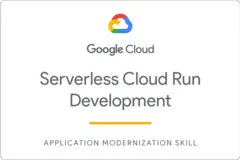
Serverless Cloud Run Development 
Learn the basics of Serverless Cloud Run Development ▼
ADVERTISEMENT
Course Feature
![]() Cost:
Cost:
Free
![]() Provider:
Provider:
Qwiklabs
![]() Certificate:
Certificate:
Free Certification
![]() Language:
Language:
English
![]() Start Date:
Start Date:
On-Demand
Course Overview
❗The content presented here is sourced directly from Qwiklabs platform. For comprehensive course details, including enrollment information, simply click on the 'Go to class' link on our website.
Updated in [May 19th, 2023]
This course provides an overview of Serverless Cloud Run Development. Participants will learn how to connect and leverage data stored in Cloud Storage, build a resilient, asynchronous system with Cloud Run and Pub/Sub, build a REST API gateway using Cloud Run, and build and expose services using Cloud Run. Upon completion of the course, participants will receive a skill badge issued by Google Cloud in recognition of their proficiency with Google Cloud products and services. The skill badge is earned by completing the Serverless Cloud Run Development quest and final assessment challenge lab.
[Applications]
Upon completion of the Serverless Cloud Run Development course, learners will be able to apply their knowledge to create and deploy serverless applications using Cloud Run. Learners will be able to build a resilient, asynchronous system with Cloud Run and Pub/Sub, build a REST API gateway using Cloud Run, and build and expose services using Cloud Run. Additionally, learners will be able to connect and leverage data stored in Cloud Storage. Finally, learners will receive a skill badge in recognition of their proficiency with Google Cloud products and services.
[Career Paths]
[Title]Data Engineering
[Description]Data engineering is a field of engineering that focuses on the development and maintenance of data processing systems. Data engineers are responsible for designing, building, and maintaining data pipelines, data warehouses, and other data systems. They must be able to work with a variety of data sources, including structured and unstructured data, and must be able to develop and maintain data pipelines that are reliable, secure, and efficient. Data engineering is a rapidly growing field, and data engineers are in high demand as organizations increasingly rely on data-driven decision-making.
[Title]Machine Learning
[Description]Machine learning is a field of artificial intelligence that focuses on the development of algorithms that can learn from data and make predictions. Machine learning engineers are responsible for developing and deploying machine learning models that can be used to solve real-world problems. They must be able to work with a variety of data sources, including structured and unstructured data, and must be able to develop and deploy machine learning models that are reliable, secure, and efficient. Machine learning is a rapidly growing field, and machine learning engineers are in high demand as organizations increasingly rely on data-driven decision-making.
[Title]Cloud Security
[Description]Cloud security is a field of security that focuses on the protection of data and applications stored in the cloud. Cloud security engineers are responsible for designing, building, and maintaining secure cloud environments. They must be able to work with a variety of cloud providers, including Amazon Web Services, Microsoft Azure, and Google Cloud Platform, and must be able to develop and maintain secure cloud architectures that are reliable, secure, and efficient. Cloud security is a rapidly growing field, and cloud security engineers are in high demand as organizations increasingly rely on cloud-based solutions.
[Education Paths]
1. Bachelor of Science in Computer Science: This degree program provides students with a comprehensive understanding of computer science principles and technologies. Students learn how to design, develop, and maintain software applications, as well as how to use data structures and algorithms to solve complex problems. Additionally, students gain an understanding of the latest trends in cloud computing, such as serverless computing, and how to use them to develop applications.
2. Master of Science in Cloud Computing: This degree program provides students with an in-depth understanding of cloud computing technologies and how to use them to develop applications. Students learn how to design, develop, and deploy applications on cloud platforms, as well as how to use serverless computing to create scalable and cost-effective solutions. Additionally, students gain an understanding of the latest trends in cloud computing, such as artificial intelligence and machine learning, and how to use them to develop applications.
3. Bachelor of Science in Information Technology: This degree program provides students with a comprehensive understanding of information technology principles and technologies. Students learn how to design, develop, and maintain software applications, as well as how to use data structures and algorithms to solve complex problems. Additionally, students gain an understanding of the latest trends in cloud computing, such as serverless computing, and how to use them to develop applications.
4. Master of Science in Artificial Intelligence: This degree program provides students with an in-depth understanding of artificial intelligence and machine learning technologies and how to use them to develop applications. Students learn how to design, develop, and deploy applications on cloud platforms, as well as how to use serverless computing to create scalable and cost-effective solutions. Additionally, students gain an understanding of the latest trends in cloud computing, such as artificial intelligence and machine learning, and how to use them to develop applications.
Course Syllabus
Build a Serverless App with Cloud Run that Creates PDF Files
In this lab you will build a PDF converter web app on Cloud Run, a serverless service, that automatically converts files stored in Cloud Storage into PDFs stored in segregated folders.Build a Resilient, Asynchronous System with Cloud Run and Pub/Sub
Use Cloud Run and Pub/Sub to run a service that manages communication through HTTP POST, email, and SMS.Developing a REST API with Go and Cloud Run
Demonstrate how to build a REST API with Go and Cloud RunCreating PDFs with Go and Cloud Run
Learn how to develop an application to create PDFs on Google Cloud using Serverless technologies and Go.Serverless Cloud Run Development: Challenge Lab
Serverless challenge lab to assess skills based on Google Cloud Serverless developer tools. Students are required to have knowledge and experitise in the area of Cloud PubSub, Cloud Scheduler and Cloud Tasks to successfully complete the lab.Course Provider

Provider Qwiklabs's Stats at AZClass
Discussion and Reviews
0.0 (Based on 0 reviews)
Explore Similar Online Courses

The Language of Hollywood: Storytelling Sound and Color

Kids with Cancer Still Need School: The Providers Role

Python for Informatics: Exploring Information

Social Network Analysis

Introduction to Systematic Review and Meta-Analysis

The Analytics Edge

DCO042 - Python For Informatics

Causal Diagrams: Draw Your Assumptions Before Your Conclusions

Whole genome sequencing of bacterial genomes - tools and applications

Serverless Data Processing with Dataflow: Develop Pipelines

Serverless Data Processing with Dataflow: Foundations


Start your review of Serverless Cloud Run Development